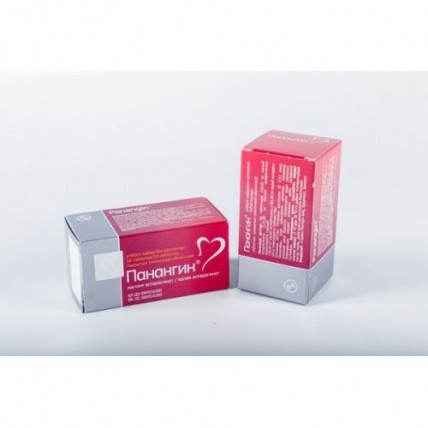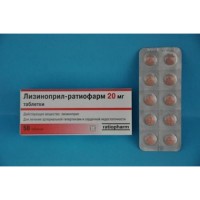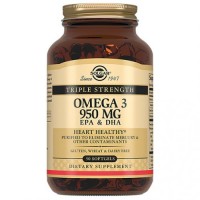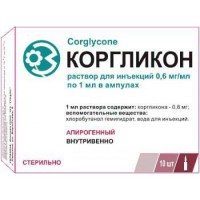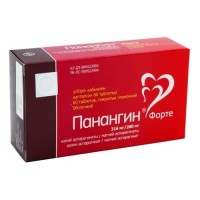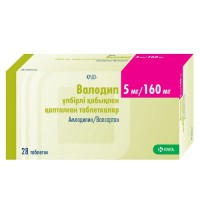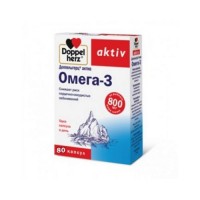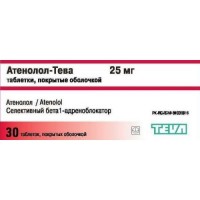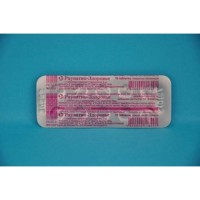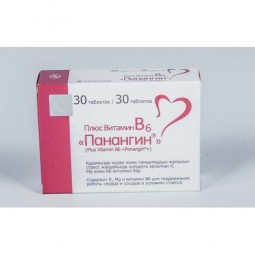Panangin® (Potassium, Magnesium Aspartate) 50 tablets
- $13.00
The instruction for medical use
of Panangin® medicine
the Trade name
of Panangin®
the International unlicensed name
Is not present
the Dosage form
of the Tablet, film coated
Structure
One tablet contains
active agents: magnesium asparaginate of 140 mg (in the form of magnesium of asparaginate of tetrahydrate of 175 mg), potassium asparaginate of 158 mg (in the form of potassium of asparaginate of the gemigidrat of 166.3 mg),
excipients: silicon dioxide colloidal anhydrous, potato starch, K-30 povidone, magnesium stearate, talc, starch corn,
structure of a cover: the macrogoal 6000, the titan dioxide (E 171), eudragit E 100, talc.
The description
of the Tablet of round shape, film coated, white or almost white color, with biconvex, slightly glossy and in insignificant degree an uneven surface, almost flavourless.
Pharmacotherapeutic group
Mineral additives. Other mineral substances.
ATX A12CX code
Pharmacological
Pharmacokinetics Magnesium properties:
The general reserve of magnesium in a human body weighing 70 kg averages 24 g (1000 mmol), from them & gt, 60% are the share of a bone tissue and about 40% for skeletal muscles and other fabrics. About 1% of the general reserve of magnesium in an organism can be found in extracellular liquid, mainly in blood. At healthy adults the concentration of magnesium in blood is in range of 0.7-1.10 mmol/l.
The recommended consumption rate of magnesium is 350 mg a day for men and 280 mg a day for women. The need for magnesium increases during pregnancy and feeding by a breast.
Magnesium is absorbed from digestive tract by active transport. The main regulator of balance of magnesium in an organism are kidneys. 3-5% of the ionized magnesium are removed with urine.
Increase in volume of urine (for example, at therapy by highly effective loopback diuretics) leads to increase in excretion of the ionized magnesium. If absorption of magnesium in thin department of intestines decreases, the subsequent hypomagnesiemia leads to excretion reduction (& lt, 0.5 mmol/day).
Potassium:
The general reserve of potassium in a human body weighing 70 kg averages 140 g (3570 mmol). It is slightly less at women and slightly decreases with age. 2% of the general reserve of potassium can be found in an organism out of cells, and the remained 98% are in cells.
Optimum consumption rate of potassium is 3 - 4 g (75-100 mmol) a day. The main way of removal of potassium – renal with which 90% of daily loss of potassium are connected. The remained 10% are removed through digestive tract. Thus, kidneys are responsible for a long-term homeostasis of potassium and also for potassium concentration in blood. In the short term the potassium content in blood is also regulated by potassium current between intracellular and extracellular space.
Jonah's pharmacodynamics of magnesium and potassium are important intracellular cations and play a key role in functioning of numerous enzymes, in linking of macromolecules with intracellular structures and also in the molecular mechanism of muscular contractility. The ratio out of - and intracellular concentration of potassium ions, calcium, sodium and magnesium affects contractility of a myocardium. Aspartate – as endogenous connection - acts as the suitable conductor of ions having high affinity to cells. Its salts poorly dissociate and, as a result, ions get in a cell as complex connections.
Asparaginata of magnesium and potassium improve metabolism of a myocardium. The deficiency of magnesium/potassium increases risk of arterial hypertension, atherosclerotic coronary artery disease, arrhythmias and metabolic changes of a myocardium.
Indications
- as additive for increase in requirement of magnesium and potassium with food
- additional therapy in chronic heart diseases (in heart failure, after a myocardial infarction), disturbances of a warm rhythm (mainly ventricular arrhythmias), with approval of the attending physician
- addition to therapy with cardiac glycosides, with approval of the attending physician
the Route of administration and doses
the Usual daily dose for adults makes 1-2 tablets 3 times a day. It is possible to raise a dose to 3 tablets 3 times a day. Gastric juice is capable to reduce efficiency of drug therefore it is recommended to take a pill after a meal.
Side effects
- increase of a chair (at use of high doses of drug)
Contraindications
- hypersensitivity to active ingredients or to any of
auxiliary components of drug
- sharp and chronic kidney disease
- Addison's disease
- atrioventricular block of the III degree, cardiogenic shock (the ABP & lt, 90 mm Hg)
- children's age up to 18 years (there is no evidential base on safety and efficiency)
Medicinal interactions
Oral tetracyclines, salts of iron and sodium fluoride inhibit absorption of drug from digestive tract. At combination therapy of drug with above-mentioned medicines the interval between receptions is necessary not less than 3 hours.
Co-administration of drug with kaliysberegayushchy diuretics and/or APF inhibitors, beta blockers, cyclosporine, heparin and non-steroidal anti-inflammatory drugs can lead to a hyperpotassemia.
Special instructions
patients should be careful when prescribing drug with the diseases which are followed by a hyperpotassemia. At this category of patients it is recommended to investigate regularly levels of ions in blood. Each tablet of this medicine contains 36.2 mg of potassium that corresponds to consider to patients with depression of function of kidneys or to the patients who are on a potassium diet.
Pregnancy and the period of a lactation
it was not reported about emergence of any danger at use of drug for this category of patients So far.
Use in pediatrics
Drug is contraindicated to children and teenagers since safety and efficiency of its use in pediatrics are not established.
Features of influence of medicine on ability to run the vehicle or potentially dangerous mechanisms
Drug does not affect ability to run vehicles and other mechanisms.
The overdose
Information on overdose of the drug Panangin® is absent, even at reception big dosed Considering ability of kidneys to remove a large amount of potassium, increase in a dose of drug can lead to a hyperpotassemia only against the background of acute or obvious disorders of removal of potassium.
Magnesium is characterized by wide therapeutic range, and in the absence of a renal failure the serious side effects are extremely rare.
According to literary data the intake of additives of magnesium inside can cause easy side reactions of type of diarrhea.
High doses of the drug Panangin®, can cause increase of a chair because of content of magnesium in them.
At intravenous use in case of fast introduction, symptoms of a hyperpotassemia / gipermagniyemiya can develop.
Hyperpotassemia symptoms: general weakness, paresthesia, bradycardia, paralysis, arrhythmia.
Gipermagniyemiya symptoms: nausea, vomiting, lethargy, hypomyotonia, bradycardia, weakness, hyporeflexia.
At overdose it is necessary to stop administration of drug, symptomatic treatment is recommended (in/in administration of Calcii chloridum, if necessary dialysis).
A form of release and packing
On 50 tablets in a polypropylene bottle with a cap, the supplied safety ring and corrugated laying from polyethylene.
On 1 bottle together with the instruction for medical use in the state and Russian languages put in a cardboard pack.
To Store storage conditions at a temperature from 15 °C to 30 °C.
To store out of children's reach!
Not to use a period of storage of 5 years after expiry date.
Prescription status
Without prescription
the Name and the country
of the JSC Gideon Richter manufacturing organization,
1103 Budapest, Dyomryoi St., 19-21, Hungary
the Name and the country of the owner of the registration certificate
of JSC Gideon Richter, Hungary
the Address of the organization accepting in the territory of the Republic of Kazakhstan claims from consumers on quality of products:
Representative office of JSC Gideon Richter in RK
E-mail: info@richter.kz
Phone number: 8-(727) 258-26-22, 8-(727) 258-26-23
of Panangin® medicine
the Trade name
of Panangin®
the International unlicensed name
Is not present
the Dosage form
of the Tablet, film coated
Structure
One tablet contains
active agents: magnesium asparaginate of 140 mg (in the form of magnesium of asparaginate of tetrahydrate of 175 mg), potassium asparaginate of 158 mg (in the form of potassium of asparaginate of the gemigidrat of 166.3 mg),
excipients: silicon dioxide colloidal anhydrous, potato starch, K-30 povidone, magnesium stearate, talc, starch corn,
structure of a cover: the macrogoal 6000, the titan dioxide (E 171), eudragit E 100, talc.
The description
of the Tablet of round shape, film coated, white or almost white color, with biconvex, slightly glossy and in insignificant degree an uneven surface, almost flavourless.
Pharmacotherapeutic group
Mineral additives. Other mineral substances.
ATX A12CX code
Pharmacological
Pharmacokinetics Magnesium properties:
The general reserve of magnesium in a human body weighing 70 kg averages 24 g (1000 mmol), from them & gt, 60% are the share of a bone tissue and about 40% for skeletal muscles and other fabrics. About 1% of the general reserve of magnesium in an organism can be found in extracellular liquid, mainly in blood. At healthy adults the concentration of magnesium in blood is in range of 0.7-1.10 mmol/l.
The recommended consumption rate of magnesium is 350 mg a day for men and 280 mg a day for women. The need for magnesium increases during pregnancy and feeding by a breast.
Magnesium is absorbed from digestive tract by active transport. The main regulator of balance of magnesium in an organism are kidneys. 3-5% of the ionized magnesium are removed with urine.
Increase in volume of urine (for example, at therapy by highly effective loopback diuretics) leads to increase in excretion of the ionized magnesium. If absorption of magnesium in thin department of intestines decreases, the subsequent hypomagnesiemia leads to excretion reduction (& lt, 0.5 mmol/day).
Potassium:
The general reserve of potassium in a human body weighing 70 kg averages 140 g (3570 mmol). It is slightly less at women and slightly decreases with age. 2% of the general reserve of potassium can be found in an organism out of cells, and the remained 98% are in cells.
Optimum consumption rate of potassium is 3 - 4 g (75-100 mmol) a day. The main way of removal of potassium – renal with which 90% of daily loss of potassium are connected. The remained 10% are removed through digestive tract. Thus, kidneys are responsible for a long-term homeostasis of potassium and also for potassium concentration in blood. In the short term the potassium content in blood is also regulated by potassium current between intracellular and extracellular space.
Jonah's pharmacodynamics of magnesium and potassium are important intracellular cations and play a key role in functioning of numerous enzymes, in linking of macromolecules with intracellular structures and also in the molecular mechanism of muscular contractility. The ratio out of - and intracellular concentration of potassium ions, calcium, sodium and magnesium affects contractility of a myocardium. Aspartate – as endogenous connection - acts as the suitable conductor of ions having high affinity to cells. Its salts poorly dissociate and, as a result, ions get in a cell as complex connections.
Asparaginata of magnesium and potassium improve metabolism of a myocardium. The deficiency of magnesium/potassium increases risk of arterial hypertension, atherosclerotic coronary artery disease, arrhythmias and metabolic changes of a myocardium.
Indications
- as additive for increase in requirement of magnesium and potassium with food
- additional therapy in chronic heart diseases (in heart failure, after a myocardial infarction), disturbances of a warm rhythm (mainly ventricular arrhythmias), with approval of the attending physician
- addition to therapy with cardiac glycosides, with approval of the attending physician
the Route of administration and doses
the Usual daily dose for adults makes 1-2 tablets 3 times a day. It is possible to raise a dose to 3 tablets 3 times a day. Gastric juice is capable to reduce efficiency of drug therefore it is recommended to take a pill after a meal.
Side effects
- increase of a chair (at use of high doses of drug)
Contraindications
- hypersensitivity to active ingredients or to any of
auxiliary components of drug
- sharp and chronic kidney disease
- Addison's disease
- atrioventricular block of the III degree, cardiogenic shock (the ABP & lt, 90 mm Hg)
- children's age up to 18 years (there is no evidential base on safety and efficiency)
Medicinal interactions
Oral tetracyclines, salts of iron and sodium fluoride inhibit absorption of drug from digestive tract. At combination therapy of drug with above-mentioned medicines the interval between receptions is necessary not less than 3 hours.
Co-administration of drug with kaliysberegayushchy diuretics and/or APF inhibitors, beta blockers, cyclosporine, heparin and non-steroidal anti-inflammatory drugs can lead to a hyperpotassemia.
Special instructions
patients should be careful when prescribing drug with the diseases which are followed by a hyperpotassemia. At this category of patients it is recommended to investigate regularly levels of ions in blood. Each tablet of this medicine contains 36.2 mg of potassium that corresponds to consider to patients with depression of function of kidneys or to the patients who are on a potassium diet.
Pregnancy and the period of a lactation
it was not reported about emergence of any danger at use of drug for this category of patients So far.
Use in pediatrics
Drug is contraindicated to children and teenagers since safety and efficiency of its use in pediatrics are not established.
Features of influence of medicine on ability to run the vehicle or potentially dangerous mechanisms
Drug does not affect ability to run vehicles and other mechanisms.
The overdose
Information on overdose of the drug Panangin® is absent, even at reception big dosed Considering ability of kidneys to remove a large amount of potassium, increase in a dose of drug can lead to a hyperpotassemia only against the background of acute or obvious disorders of removal of potassium.
Magnesium is characterized by wide therapeutic range, and in the absence of a renal failure the serious side effects are extremely rare.
According to literary data the intake of additives of magnesium inside can cause easy side reactions of type of diarrhea.
High doses of the drug Panangin®, can cause increase of a chair because of content of magnesium in them.
At intravenous use in case of fast introduction, symptoms of a hyperpotassemia / gipermagniyemiya can develop.
Hyperpotassemia symptoms: general weakness, paresthesia, bradycardia, paralysis, arrhythmia.
Gipermagniyemiya symptoms: nausea, vomiting, lethargy, hypomyotonia, bradycardia, weakness, hyporeflexia.
At overdose it is necessary to stop administration of drug, symptomatic treatment is recommended (in/in administration of Calcii chloridum, if necessary dialysis).
A form of release and packing
On 50 tablets in a polypropylene bottle with a cap, the supplied safety ring and corrugated laying from polyethylene.
On 1 bottle together with the instruction for medical use in the state and Russian languages put in a cardboard pack.
To Store storage conditions at a temperature from 15 °C to 30 °C.
To store out of children's reach!
Not to use a period of storage of 5 years after expiry date.
Prescription status
Without prescription
the Name and the country
of the JSC Gideon Richter manufacturing organization,
1103 Budapest, Dyomryoi St., 19-21, Hungary
the Name and the country of the owner of the registration certificate
of JSC Gideon Richter, Hungary
the Address of the organization accepting in the territory of the Republic of Kazakhstan claims from consumers on quality of products:
Representative office of JSC Gideon Richter in RK
E-mail: info@richter.kz
Phone number: 8-(727) 258-26-22, 8-(727) 258-26-23
